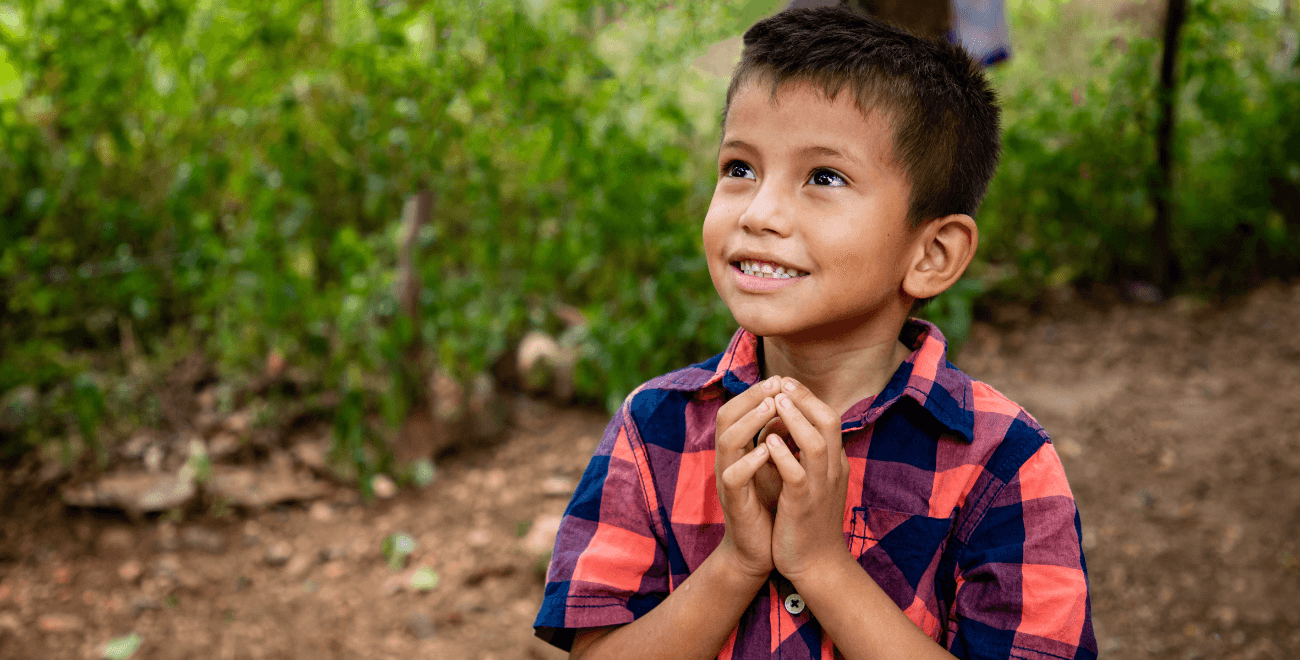“I Am Beautiful As I Am”
How this courageous girl from Indonesia is fighting bullying and changing attitudes.

Karunia is unique.
She’s confident, bubbly with a fierce sense of humour. Most days she can be found on the school running track or humming tunes to herself with a colouring pencil in hand. This extroverted 8-year-old loves to sing and dreams of recording her own album.
Karunia also has Apert syndrome, a genetic condition affecting the skull bones and hands.
And in the remote Bongkudai village, North Sulawesi, Indonesia, there’s little help and support for children born with any form of disability. When she was born, Karunia’s own father tried to hide her condition.
Terrified of the future
When Candra first held his beautiful baby daughter in his arms he looked down to see her fused fingers and toes. He noticed the shape of her face was different. A local farm labourer, born and raised in Bongkudai, he’d never seen a child with these features before.
Confused and deeply apprehensive, he took the drastic step of trying to hide Karunia’s condition from his wife. “I cried when I saw my baby for the first time,” explains Candra. “Sad is what I felt.”
Angel, Karunia’s mum, found the situation overwhelming. “My husband, parents and all my family members were hiding the real condition of my baby,” she remembers . “Any time they gave my baby to me to breastfeed, they wrapped her with a blanket, and she wore gloves and socks so I wasn’t able to see her hands and feet.”

It was a few weeks before Candra felt able to share Karunia’s full diagnosis with Angel. “My body was shivering upon hearing the confession of my husband,” describes Angel. “I just cried and wondered why God had entrusted this to me.”
Locally there was misunderstanding and fear surrounding Karunia. Candra and Angel found it incredibly painful when local children would run away afraid from their baby girl.
Hope offered by the local church
From the start, our local church partner was committed to supporting the family and educating the wider community about Karunia’s worth. Angel and Karunia were enrolled in Compassion Child Survival Interventions where Angel was given parenting classes. Through home visits and activities, Angel and Candra began to feel supported and hopeful for their daughter’s future.

Early intervention from the programme helped Karunia to grow healthily. With no hospital in Bongkudai and a four hour drive to the capital of North Sulawesi, Manado, the monthly medical checks provided by the project were crucial. In 2012, the programme, in conjunction with a government grant, enabled Karunia to have an operation to create fingers on her right hand.
"Watching Karunia now, drawing and writing, it’s clear this surgery has brought her immeasurable freedom.
In 2015, Karunia graduated to the Child Development Sponsorship Programme and she continues to thrive. “I love to play with my friends at school and at the project,” she says.

“I love to lead prayers or singing and I have a dream to be a singer in the future.” Thanks to the support of her sponsor and our Health Interventions, Karunia will be able to undergo a further operation on her left hand later this year.

Brimming with self confidence
As I sit chatting with Karunia, it’s evident her parents, project workers and teachers have spent hours encouraging her. You can see the fruit of the years of Compassion project lessons teaching self-confidence and identity in God. She clearly knows that she is a precious creation.

Her self-assured words speak for themselves:
“When my friends mocked me because I don’t have normal fingers, my mum taught me to say back to them that this is what Jesus gave me,” Karunia says.
"I am beautiful as I am. I know I am beautiful like my mum.W
Karunia’s attitude is infectious. Her dad Candra shares honestly about how the experience of parenting a daughter with additional needs has changed him. “I know God has a purpose for her,” he explains. “My daughter has taught me to be a strong person.”
Words by
Vera Aurima, Rebecca Corbett
Share:
Share:
Pray with us
Join thousands of people praying to end poverty, take action through our appeals and activities, and be inspired by how God is changing lives.
Get a little Compassion in your inbox with our Prayer and Stories email.
Remember, you can unsubscribe at any time. Please see our Privacy Policy for more information.
